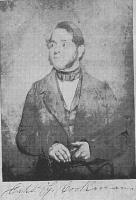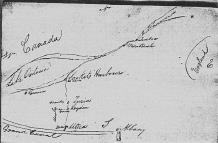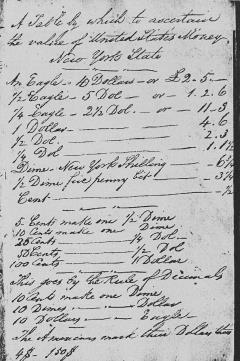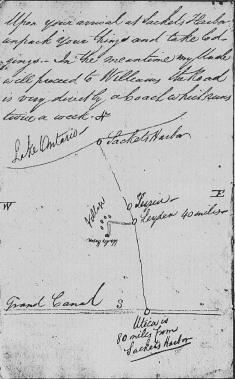"Hints To An Emigrant" is a captivating manuscript, written in 1823, in booklet form, by a 22-year-old seafaring Englishman named George Grimston Cookman. Throughout the neatly scripted pages the young Yorkshire native advises his uncle, Francis Cookman (eventual Lacolle, Quebec, settler), on many facets of the journey from their home on England's east coast, to the Great Lakes of North America.

Francis Cookman and his family chose to emigrate from their mother country, as did many English during the post Napoleonic Wars depression. They were carefully led by young George Grimston Cookman's experience, as he was already familiar with the journey, its necessities, and its potential complications.
This fascinating document gives recommendations on cross-country travel from Owthorne Parish, just outside of Hull, Yorkshire, England. It directs the emigrants via canal and stagecoach to Liverpool and offers suggestions on how to employ a trustworthy captain and obtain passage on a sturdy ship to America. Many details, from provisions and rations to currency exchange, are covered in this historic nineteenth century leaflet. The young Cookman even offers particulars on how to deal with seasickness and other maladies associated with the difficult ocean voyage.
On August 28th, 1823, just two days before Francis' family is to leave England, George learns of his uncle's intended route. His commentary spills out over the pages as he leads his relatives with confidence up the St. Lawrence River to Montreal, Quebec. With hand drawn maps Cookman guides his kinfolk toward Sackets Harbor, New York, and their presumed destination, Leyden, in Lewis County, New York, the home of Francis' brother, George's other uncle, William.
William Cookman came to America several years prior, leaving his wife and their children behind. By 1818 he was remarried in America and the first child from this new union had been born. The circumstances of the dissolved relationship are not known. Records show however that William's father helped provide for his abandoned daughter-in-law and her children back in England.
Francis Cookman and his family left Hull on August 30th, 1823. They settled in Bogton, a hamlet in the seigniory of Lacolle, Quebec, in 1825. An esteemed Englishman, Francis was known as "The Father of Bogton." He operated a day school there for over seventeen years and was a pillar of the Lacolle community.
George Grimston Cookman's father was the eldest of the trio of Yorkshire brothers. He remained in England and led a successful life in Hull as a businessman, landowner, and politician. He served as an Alderman and was Mayor of Hull in 1837 and 1838.
George eventually settled in North America, as his uncles William and Francis had. He was inspired to preach the gospel, and in 1826 he became a Methodist minister. He was transferred to Baltimore in 1833, and was twice chosen chaplain to Congress. He led prayer every Sunday morning in the House of Representatives, and attracted large crowds, among whom were prominent statesmen of the day, including John Quincy Adams, Daniel Webster, and Henry Clay. Rev. Cookman apparently made regular transatlantic voyages to and from England. He died aboard the steamship "President" when it sank and all were lost on a wretched voyage from New York to England in 1841. It was the first steam powered passenger vessel to go down on the Atlantic route.
Today there are Cookman descendants scattered all across the North American Continent. They are fortunate to have this manuscript preserved to complement their family history. Indeed, all of us who have ancestors who came via ship can appreciate the detail provided by Rev. Cookman in his booklet, "Hints To An Emigrant."
Thank you to Mrs. Louise "Josie" Mintun and family of Santa Rosa, California, for transcribing, sharing, and allowing publication of this precious historic heirloom.
Hints to an Emigrant: Transcribed
Hints to an Emigrant
presented by
George Grimston Cookman
to His Uncle
Francis Cookman
May 5th 1823, Hull
In leaving home and traveling across the country for Liverpool to take ship there are two or three Remarks worthy of notice on household furniture:
- Take no beds with you whatever. the beds which you have you must sell at the best market-and when you arrive at Liverpool purchase mattresses suited for ships use and which may be bought at a low rate. These mattresses may be used upon your arrival at New York.
- Let the men dispose of their knee breeches as quickly as possible and let each of them provide himself with a pair of trousers. I should recommend have many things light and thin, most suited to the hot climate of America.
- If you have any Bacon by you I should advise you to take it with you to Liverpool.
Journey to Liverpool
The Steam Boat from Hull to Selby is undoubtedly the cheapest conveyance. the fare being only 2/6 Best Cabin, 1/-front Cabin. As the Trunks must go by the Sloop conveyance thro the canals at Liverpool. One of the Young Men ought to accompany them and see that they are taken care of. He can rest in the sloop or walk by the Canal just as he pleases.
As to the rest when they arrive at Selby they must take outside places to Leeds fare 5/-. Comfortable Board and Lodging may be obtained at one of those respectable eating Houses which are so numerous.
In leaving Leeds by Coach for Liverpool be very careful to take your place direct thro to Liverpool. If you take it only to Manchester it will cost you two or three shillings extra. Set off early in the morning and you will arrive at Liverpool that night. The cheapest method of Coach Travelling is to call for Bread, Cheese and ale instead of regular meals.
Upon your arrival at Liverpool enquire for Mr. Whitakers, Elbow Lane Dale St. There take up your Lodging and Board. You can either pay him for the use of Rooms and cook for yourself or Board and Lodge with him at so much a day.
To Mr. Whitaker present my Letter and he will give You every necessary information with respect to your Shipping etc. Mr. Whitaker is well acquainted with the American Ships & Captains.
Directions as to taking your passage in a Ship
If there be any good transient Ships, that is any ships not in the line of Packets, ready to sail, I should recommend them rather than a Packet for this reason that you will be more respectfully treated as Steerage Passengers.
Do not be in too great a hurry about engaging yourselves in any vessel, you may take Whitakers advice, but enquire and examine for yourselves. See whether the rigging be strong, whether the sails be sound, and whether the Vessel be a good sailor, and whether the Captain is a careful Man.
Be very particular as to the character of your Captain as your safety and your comfort very much depend upon this.
Never mind the value of £1 or £2 a Head in comparison of having a good Ship and Captain.
Having at length found a good Ship-Observe-Make your own bargain. Don't employ a broker, don't employ even Whitaker, but see the Captain yourself, and agree with him.
Do not pay down the whole of your passage Money-give him half. It is a good check.
Take a Receipt and Agreement signed with the Captain's own hand. You will go for £5 ahead.
In selecting your Bed Place which you must do the very instant you make your bargain, I would advise you to take the upper berth opposite the Hatch Way. I recommend this on account of its having the most fresh Air in Hot Weather.
Immediately get in your Boxes and Baggage and stow them fast-clinch your chests and Trunks to the floor to hold them firm in stormy Weather.
If you go in the Steerage the Captain may pass you in the Custom House. if not you must for once employ a broker /Whitaker will recommend one/ and he will show you how to take the oaths, and what Rooms you are to enter. The Broker whom I employed charged me only 2/6 for his trouble.
Having passed the Customs House your next business will be to provide provisions for your voyage. An inventory of Articles necessary for one Person during his voyage across the Atlantic to or from America:
|
20 lbs ham |
12 lbs beef 5 lbs butter 14 lbs flour 2 lbs coffee 1lb Sugar Turnip 2 lbs Currants 10 lbs Rice 1 Bottle of Mustard 1 Bushel Apples ½ Gal Brandy |
Take a bottle of Elixir of Vitriol for taking the bad taste from the water.
| Cooking Utensils: | 1 gal Saucepan 1 Coffee Pot 1 Tin for baking 1 Tin or Pewter plate 1 Knife & Fork 1 Table Spoon 1 Tea Spoon |
|
Bedding: |
1 Mattress |
Medicine
A few Anti Bilious Pills. But you may apply to the Ships Chest.
Clothing
I should advise the Men to provide themselves at Liverpool with a good rough top coat, a piece, and let each take an extra suit only don't take knee breeches. You must have trousers. I recommend this because clothing is nearly double in price in the States.
Also let each Man take a right good hat. Also a strong pair of worsted mittens, they are very comfortable in cold wet stormy weather. Also a hairy [?] cap.
At Sea
- As you will cook your own victuals-you will do well to make friends with the Cook, as much of your comfort and convenience depends on him. I should therefore recommend that you give him 1 Dollar in the very beginning of the Voyage And do not trust your victuals to his management, (for if you do they are sure to be spoiled) but look after the cooking yourselves and minute every thing.
- You will find on board many persons who want different things and who will be continually begging. now you must not be too free in your bounty to these, lest you run short yourselves. However you may accommodate in little matters provided the person be civil and obliging.
- You will find apple dumplings rice puddings and sea pies most palatable of any victuals.
- I should advise you to take occasionally a glass of brandy & water or rum and water-it heals the stomach from the sharpness of the sea air, especially after sea sickness.
- Respecting sea sickness - You will all of you will be visited with sickness more or less. Now do not offer to stop it but let it have free course and expend itself. The best cure is to try to eat. Meat will loathe to the stomach, but force it down and it will set all right sooner than anything I can propose. As a desperate remedy drink a pint of salt water. Do not be alarmed if it be very violent, it will abate in time. Particularly avoid during sea sickness ardent spirits or oranges or fruit of any kind.
- Be very particular as to cleanliness in bedding and in management of the Steerage. Wash yourselves and clean out the steerage every morning and expose the bedding once a week.
Hull, 28th August 1823
As I am given to understand that you are going by the way of Quebec, I should advise
- That upon your arrival you waste as little time as possible on shore, but after taking two or three days rest you embark on board a vessel down the St Lawrence. Now observe the following places for your Government.

Williams at Turin [N.Y.], you must embark at Quebec direct for Sackets Harbor. This you must do not on board the Steam boats for that is very expensive, but on board a good smart sailing vessel where you will fine good accommodation and stowage for all your goods etc. Before you go on board Be sure to make your bargain and take a written receipt or agreement from the Captain as you would if leaving England.
I really do not know what the terms are on those vessels-but I would have you find yourselves in victuals.
In choosing a vessel of this kind be sure to take particular notice that your beds are good and that you have plenty of them. I mean in number. For your voyage will be both long and rough. Don't embark on board a small light shallow vessel
But before we go any further let me:
- Warn the Young Men against indulging in drinking ardent spirits or eating too plentifully of fresh provisions (fruit especially) at first landing from the ship at Quebec. Many persons have killed themselves in this manner at first landing. So lay a little restraint upon yourselves-you will find yourselves the gainers by such self denial.
- Lay out as little money as possible at Quebec, for all money laid out there will lose the benefit of the exchange which is 13 percent at Albany and New York.
- I believe the money at Quebec is the same as at Hull.
In changing money-take no Half Dollars, nothing but Dollars. For if you should want to change again the Money Jobbers and Bankers will not take them.
If you have to take Bills to any Amount refuse all except United States Notes. The reason is this, not only that the United States Notes are safest but if you travel out of New York State the Bank will not accept Provincial Notes without a very considerable discount.
In small trifling matters you will be forced to accept Provincial Notes-but in this case accept New York Bank Notes only and of these the Eagle Bank and the Farmer & Mechanics Bank are the most respectable.

When I was in America the Ballance of Trade was in favor of England and in consequence 12 per Cent in our favor. This gives you a profit of about 2/6 on every pound sterling.
2/6 on £1.00
12/6 on 5.00
25/- on 10.
50/- on 20
£3.2.6 on 25 and so on.
Remember all English Silver is taken at Bullion value only in the States. You will get only 9 [per cent?].
Upon your arrival at Sackets Harbor unpack your things and take lodgings. In the meantime my Uncle will proceed to Williams. The Road is very direct by Coach which runs twice a week.
The distance from Sackets Harbor to Leyden is 40 miles. At Leyden the Coach will put you down and you will walk on foot down a bye road by Mr. Constables Hall and up the High Hill to my Uncles House which is the Second from the Top of the Hill.
When you enter the States you will meet with many things odd and different from home. Some of the Yankees will insult old England - now don't quarrel with them but be silent and remember - you are now to be Americans.
As to General Advice you will be well instructed by my Uncle, however I would say, Do not Purchase of some time-Say a Twelve Month. No doubt many tempting offers will be made, but never mind. Keep your money until you obtain a clear knowledge of the Country.
In the mean time for the sake of employment, and maintenance of your family, hire a farm for a Twelve Month. Several may be obtained on good terms-I heard Devereaux the Store Keeper at Utica had some to let.
And when you do purchase be very particular about your title, as a good title to an Estate is very scarce. A Government Title is the best if it can be obtained. Your experience in England about titles will teach You to be careful. Purchase no land of which You cannot obtain a good title.
Observe
When you enter the States do not look about you as strangers for if You do the People will try to impose on You, but bustle about like men who understand bussiness. Hold up your heads, speak with boldness, for America is a free Country.
But seriously, you must assume some authority or you will not be attended to. For a barbers apprentice will give himself the air of an Arch-bishop.
I give you
Mr. Martineau, Engineer on the Canal, Schenectady.
If this gentleman be at or about Schenectady I would have my uncle travel to him and deliver the letter as an introduction. Mr. Martineau is a friend of mine and being fully acquainted with all that Country can give some very valuable information.
If however my Uncle does not think proper to go to see him he must put this letter with my other letters into the Post at Utica.
|
The parcel directed |
Mr. Hicks |
You must deliver yourself-it will be an introduction-and no doubt Mr. Hicks can assist you in obtaining Lodgings at Quebec and in the choice of a vessel for Sackets Harbor. Mr. Hicks is a Hull man and married Miss Shepherd daughter of Mr. Shepherd the Ship Builder.
[end of transcription]

Harbor, Leyden, Turin.
Mickey Maynard is an author, historian, and publisher of The English Settlers of Lacolle, Quebec website. To learn more about the migration and settlement of the English in Lacolle, search Google with the key words "English, Settlers, Quebec."
Note from the editor: Rev. Cookman's original manuscript contains abbreviations such as "thru" and sometimes used an ampersand in place of the word "and." He also omitted apostrophes, capitalized a number of nouns that we would not usually capitalize, and, in some instances, did not capitalize the first word of a sentence. In these instances I have maintained Rev. Cookman's choices.
However, rather than insert periods or commas, he occasionally used a dash. In these cases I have inserted commas or periods as the text indicated.
Prepared by George Grimston Cookman for his uncle, Francis Cookman. Introduction by Mickey Maynard.
Originally published in The New York Researcher, Summer 2006
© 2011 The New York Genealogical and Biographical Society
All rights reserved.